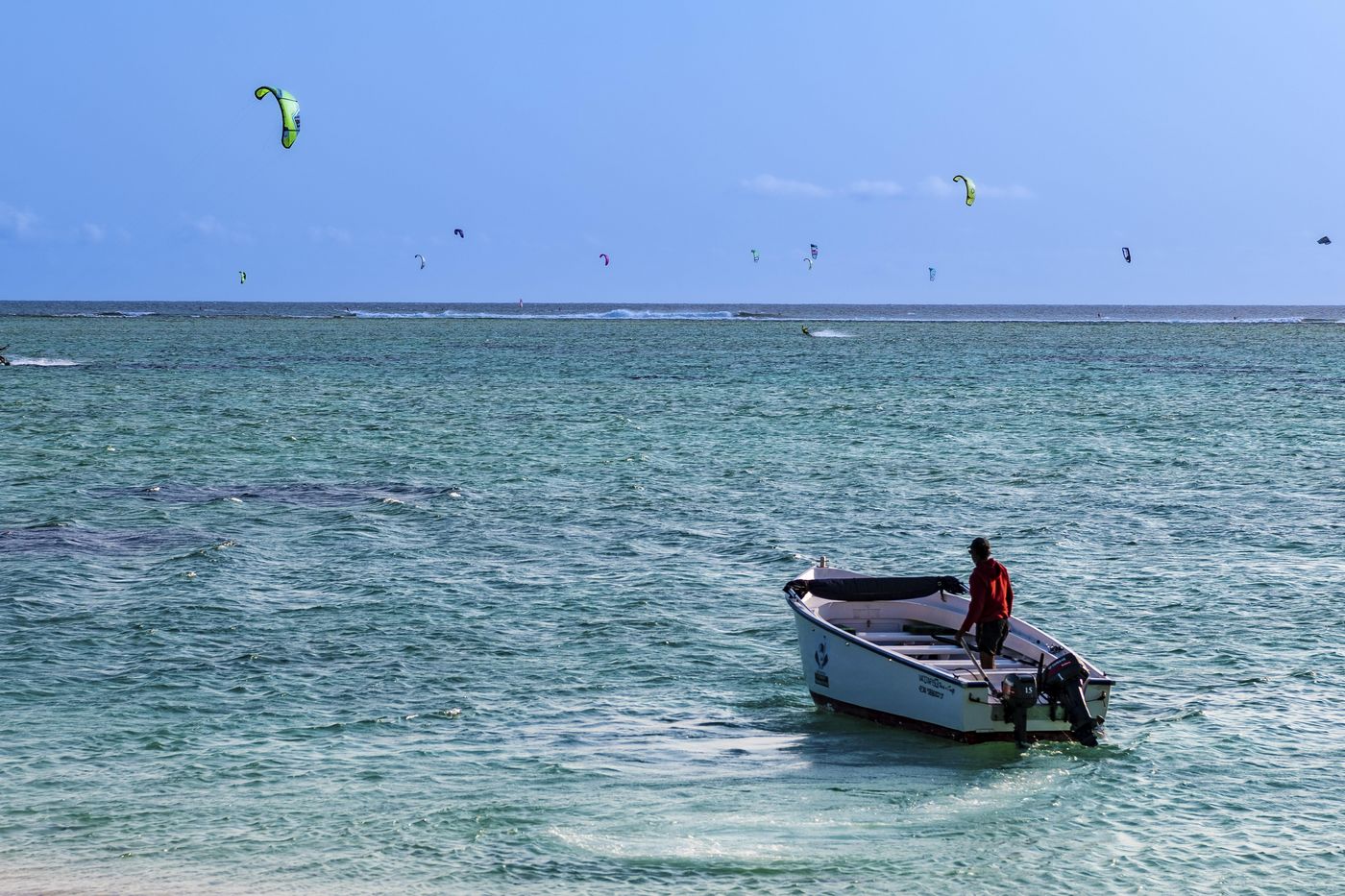
A small boat and kite surfers in the Indian Ocean on the South Coast of Mauritius, September 18, 2024.
© picture alliance / imageBROKER | Ingo Schulz
In this interview with Megatrends Afrika, Nad Sivaramen discusses implications of Trump 2.0 for Mauritius and the broader Indian Ocean region. He outlines how a small island state can navigate this new, volatile world.

A small boat and kite surfers in the Indian Ocean on the South Coast of Mauritius, September 18, 2024.
© picture alliance / imageBROKER | Ingo Schulz
Megatrends Afrika: How are the first months of the new Trump administration debated in Mauritius among policy makers, but also the wider public?
Nad Sivaramen: The early months of Trump’s return to the White House are viewed with a mix of strategic curiosity and political anxiety in Mauritius. Among policymakers, the focus has largely been on one issue: the Chagos Archipelago. Trump has managed to do what few others dared—transform a longstanding decolonization dispute into a real estate negotiation. His transactional worldview treats sovereignty like an asset: if it cannot be monetized or strategically leveraged, it holds little value. When he expressed openness to a long-term lease of Diego Garcia to the U.S. in exchange for symbolic recognition of Mauritian sovereignty, Port-Louis listened closely.
Prime Minister Navin Ramgoolam welcomed these statements as “positive.” But among the wider public and civil society, the mood is more cautious. There is a growing awareness that what’s being offered may be a sovereignty on paper—Mauritius gets its flag, but Washington keeps the keys. For many, the concern lies not just in the deal itself, but also in the precedent: if sovereignty can be bought, what’s next?
At the same time, there’s little illusion left about the nature of Trump’s foreign policy. This is not diplomacy anchored in values or law. This is power, reduced to its transactional essence. And Mauritius, as a small island state, must navigate this world carefully, knowing full well that in the Trump doctrine, nothing is sacred—only useful.
Megatrends Afrika: Where do you see the largest challenges and opportunities for Mauritius right now and in the mid-term resulting from the changing U.S. policy?
Nad Sivaramen: The greatest challenge Mauritius faces is economic. Trump’s approach to global trade—tariffs, unilateralism, disregard for the World Trade Organization—directly threatens the fabric of the small, export-oriented Mauritian economy. If the African Growth and Opportunity Act (AGOA) is not renewed beyond 2025, or if it is significantly altered, Mauritius’s textile industry, already fragile, could lose crucial market access. This would hit employment hard, particularly for women.
Mauritius does not have the luxury of absorbing such shocks. Protectionist surges in Washington, D.C., would translate directly into job losses in Vacoas and Quatre Bornes. A trade war between the U.S. and China, or tariffs on African goods, would ricochet across our supply chains. And unlike Trump’s America, we cannot print our way out of trouble.
But even in this climate, there are strategic openings. The Chagos question—if handled with tact—could bring long-overdue closure to a colonial injustice. There is also space to position Mauritius as a neutral, reliable partner in a region increasingly marked by big-power rivalry. If Washington looks for stable gateways to Africa, Mauritius can offer that. But it will need to be done on our terms—not as pawns in a larger geopolitical auction.
Megatrends Afrika: What strategies of engagement does your country follow in light of the new administration rising to power and a seemingly ever more fragmented world?
Nad Sivaramen: Mauritius must act like a small boat in turbulent waters—never still, always adjusting its sails. The world Trump is shaping, or rather accelerating, is one where multilateralism is hollowed out and replaced by bilateral deals based on brute interests. In this fragmented world, our first line of defence must be diplomatic agility.
Three strategies are emerging. First, deepening regional ties. The Indian Ocean Commission, African Union, and alliances with East African states must serve as buffers against isolation. Second, geopolitical diversification. India, China, and the Gulf States are all vying for influence in the Indian Ocean. Mauritius must engage all, align with none. Non-alignment, updated for the 21st century.
Third, Mauritius must weaponize its legal and institutional capital. The Chagos case showed that global courts still matter—when leveraged strategically. Any future agreement with the U.S. or UK over Diego Garcia must be anchored in international law, not political expediency.
Above all, Mauritius must refuse to be trapped in the logic Trump champions: that everything is for sale. Our territory, our sovereignty, our future—these are not negotiable assets. They are foundations. And in this increasingly cynical world order, standing by those principles may be the most strategic choice of all.
Nadarajen (Nad) Sivaramen is a seasoned journalist and media professional from Mauritius. He has been serving as the Director of Publications at La Sentinelle since April 2013.
The responsibility for the content, opinions and sources presented in the articles and interviews lies with the respective authors.
In this interview with Megatrends Afrika, Dr Abel Abate Demissie discusses implications of Trump 2.0 for Ethiopia and the Horn of Africa, emphasizing how USAID cuts could increase regional instability. He highlights the importance of collaborating on challenges such as illegal migration and security.
In this mini-interview with Megatrends Afrika, Dr Amgad Fareid Eltayeb explains how Sudanese frustrations with US policymakers go beyond the Trump administration and how he views US aid cuts in Sudan.
The Republican victory in the recent US election is being celebrated in the Sahel. Many there see President Donald Trump as an “anti-imperialist”, “peacemaker” and “advocate of traditional values”. These perceptions are shaped by local neo-sovereignist narratives.
The Zambian government aims to optimize mining revenues, trade and investments to address budget shortfalls created by the Trump administration’s sudden cuts to US aid. This presents an opportunity for the EU to expand its economic cooperation with Zambia.